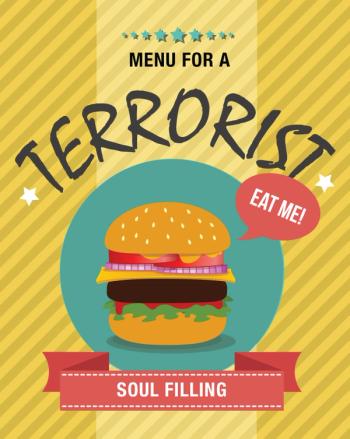
The authors explore possible reasons why young people in the West leave their families, friends, and home culture to join terrorist organizations.

The authors explore possible reasons why young people in the West leave their families, friends, and home culture to join terrorist organizations.

The authors summarize findings from the first study to compare suicide risk for veterans who do and those who do not use VA services.

Radicalization by Norwegian converts to the Prophet’s Ummah produced massive and terrible social consequences. The explanations offered may be pertinent to the current attraction that ISIS offers for too many young persons in many countries of the civilized world.

Aggressive and impulsive behaviors in schizophrenia pose many clinical challenges. The best way to reduce the risk of aggression is with adequate treatment of schizophrenia.

If forgiveness soon after trauma helps avert mental disorders or retaliation, how could the aftermath of the Charleston tragedy not end up being one of the great moments of forgiveness in history?

Professions, psychiatry included, do not have a stellar record of protecting those they serve. Do we have reason to believe that professional organizations or corporate entities can be trusted to protect their clientele?
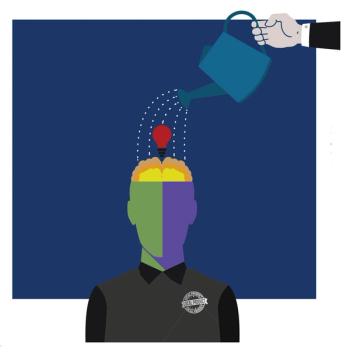
The author applies psychodynamic psychology to understand and recognize so-called "homegrown" terrorists, individuals who are familiar with American culture and thus more difficult to detect.

Your patient is recovering from a traumatic brain injury. He asks you, “Doc, why do I need so much extra sleep?”
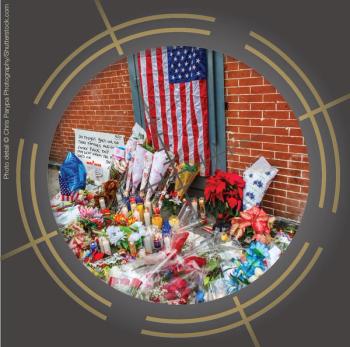
Dr Thompson introduces a Special Report meant to provoke thoughtful contemplation on various topics related to aggressive behavior.

What role might electroconvulsive therapy play for short-term treatment of agitation and aggression in patients with dementia?

This review critically addresses 4 central assumptions that underlie many US political and popular associations between gun violence and mental illness.

The key focus is on understanding violent offending (eg, reactive, proactive, firearm violence) tied to antisocial personality disorder and psychopathy using a psychobiological lens.

Here: a close up look at impulsive aggression.

Neither facile liberal censure nor rabid applause from the right speak to Eastwood’s purposes in this superbly crafted picture.

Here's how a single question I don't normally ask changed the course of one patient's life. The story highlights how widespread the effects of violence are.

Today, we embrace the collective experiences of our fellow members of the human race, this Holocaust Remembrance Day and 70th Anniversary of Auschwitz liberation.

A commentary on civility and ethical standards in the aftermath of terrorist events in France.

A commentary on France's response to recent acts of terrorism that unified a nation and the world, co-written by a psychiatrist who was at the Paris Rally.

The greatest tribute to those who perished in France may be to find better ways to put out the fires of terrorism. Mental health professionals are trained to use words to diffuse conflict. The pen is mightier than the sword, but it can also tempt the reckless to load their weapons.

Do persons with depression and a history of early life trauma benefit more from psychotherapy or pharmacotherapy? Take the quiz and learn more.

For us to intervene and prevent injury, we need to ask patients probing questions about their relationships, and whether they feel safe at home.

What is the association between bipolar disorder, trauma, and violence? Here: a guide to assessing violence potential in bipolar patients.

We need to join forces with our natural allies: the patients we treat and their families, as well as government, community, and business leaders, to make addressing the impact of violence and abuse one of our highest public health priorities.
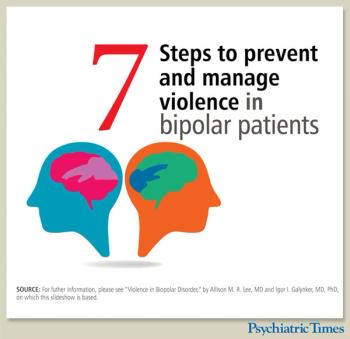
The bipolar diagnosis introduces some unique aspects to violence prevention and management, although the general principles are similar to those for patients with other psychiatric disorders. More in this slideshow.
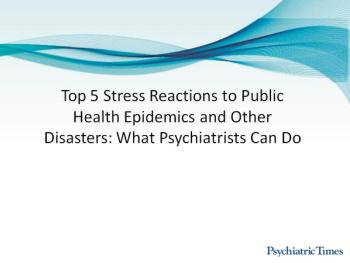
People experience a spectrum of reactions as a result of epidemics, such as Ebola, and disasters, such as weather-related events. Psychiatrists can provide interventions for those who are in distress with a special focus on mitigating these disaster stress reactions.